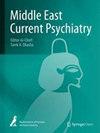Perceived parenting styles and bonding among adolescents with mental illness: Okasha Institute of Psychiatry experience
IF 1.6
Q3 PSYCHIATRY
引用次数: 0
Abstract
Worldwide, at least 10% of adolescents have a documented mental illness, which is a leading source of morbidity, mortality, and functional impairment. Among individuals aged between 10 and 24 years, psychiatric disorders account for 45% of all years lived with disability. Parenting discipline styles are fundamental in shaping adolescents’ emotional integrity, cognitive capabilities, and behavioral patterns. To compare parenting styles and parental bonding dimensions in adolescents with different psychiatric disorders versus a group of healthy adolescents matched for age and sex. A case–control study conducted at Okasha Institute of Psychiatry, Ain Shams University Hospitals, involved 50 participants of adolescents diagnosed with variable psychiatric disorders and 50 matched healthy controls. Authoritarian parenting style was evident in mentally ill adolescents, while authoritative parenting style was prevalent in healthy controls. In terms of parental bonding, mentally ill adolescents experienced a low level of care and a high level of overprotection from both parents. The results of the study demonstrated that parenting styles may serve as predictors and predisposing factors for psychiatric disorders in adolescents. Adolescents with psychiatric disorders perceived both parents as more authoritarian, less authoritative. They also received a low level of care and a high level of overprotection from both parents.患有精神疾病的青少年对父母教养方式和亲子关系的看法:奥卡沙精神病学研究所的经验
在全球范围内,至少有 10%的青少年患有有记录的精神疾病,这是导致发病、死亡和功能障碍的主要原因。在 10 至 24 岁的人群中,精神障碍占残疾生活总年数的 45%。父母的管教方式是塑造青少年情感完整性、认知能力和行为模式的基础。目的是比较患有不同精神障碍的青少年与一组年龄和性别匹配的健康青少年的养育方式和父母亲情维度。艾因夏姆斯大学医院奥卡沙精神病学研究所进行了一项病例对照研究,研究对象包括 50 名被诊断患有不同精神障碍的青少年和 50 名匹配的健康对照组。在患有精神疾病的青少年中,专制型养育方式十分明显,而在健康对照组中,权威型养育方式则十分普遍。在亲子关系方面,患有精神疾病的青少年从父母那里得到的关爱程度较低,而父母的过度保护程度较高。研究结果表明,父母的教养方式可能是青少年精神障碍的预测因素和诱发因素。患有精神障碍的青少年认为父母双方都比较专制,权威性较低。同时,他们从父母双方那里获得的关爱程度较低,过度保护程度较高。
本文章由计算机程序翻译,如有差异,请以英文原文为准。
求助全文
约1分钟内获得全文
求助全文
来源期刊

Middle East Current Psychiatry
Medicine-Psychiatry and Mental Health
CiteScore
3.00
自引率
0.00%
发文量
89
审稿时长
9 weeks
 求助内容:
求助内容: 应助结果提醒方式:
应助结果提醒方式:


